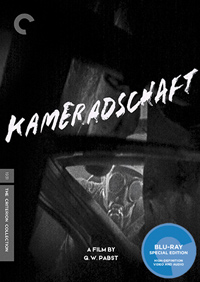 A progressive call to unity between the historically at odds French and German cultures, G.W. Pabst’s 1931 classic Comradeship (Kameradschaft) which concerns a team of French workers caught in a collapsed coal mine as a valiant group of altruistic German miners take great pains to extricate them, is loosely based on a famed 1906 Courrieres mining disaster in northern France. Pabst updates his drama to just after WWI in an old coal mine straddling the French-German border in the Lorraine region. German and French co-workers exist contemptuously side-by-side, as evidenced by a minor scuffle over an aggressive German suitor (Fritz Kampers of Westfront 1918) who attempts to convince a French woman, Francoise (Andree Ducret) to dance with him (the sequence recalls Francois Ozon’s Frantz, which similarly examines the rift between these specific cultures post WWII, a remake of Lubitsch’s 1932 title Broken Lullaby).
A progressive call to unity between the historically at odds French and German cultures, G.W. Pabst’s 1931 classic Comradeship (Kameradschaft) which concerns a team of French workers caught in a collapsed coal mine as a valiant group of altruistic German miners take great pains to extricate them, is loosely based on a famed 1906 Courrieres mining disaster in northern France. Pabst updates his drama to just after WWI in an old coal mine straddling the French-German border in the Lorraine region. German and French co-workers exist contemptuously side-by-side, as evidenced by a minor scuffle over an aggressive German suitor (Fritz Kampers of Westfront 1918) who attempts to convince a French woman, Francoise (Andree Ducret) to dance with him (the sequence recalls Francois Ozon’s Frantz, which similarly examines the rift between these specific cultures post WWII, a remake of Lubitsch’s 1932 title Broken Lullaby).
Pabst uses the scenario to explore the difficulty of overcoming extremist nationalism between the French and the Germans, a sentiment that was short lived as a year after Comradeship premiered, the Nazis began their ascent to power. Although the juxtaposed miners tend to blend together as far as characterization, Pabst allows Andree Ducret to standout as the reluctant girlfriend of one of the French miners. Working class gripes between both parties paints a portrait of simmering tensions and men looking for any excuse possible to resort to fisticuffs. Some excellent war-time flashback sequences, wherein a trapped French miner lashes out in violence as the tapping of the metal piping recalls the sound of bullets ripping through the air from his time in the trenches, lends a certain suffocating hopelessness to the narrative, which succeeds as a humanistic treatise against what we’re led to believe are impossible odds.
Disc Review:
Criterion also presents Comradeship in its original aspect ratio of 1.19:1 in a new 2K digital restoration with uncompressed monaural soundtrack. The final product was a painstaking project which called for the melding together of elements from the French and German dupes of the film (several sequences as the Germans plumb the dark depths of the tunnels are still marred by extreme defects which were unable to be scrubbed).
Hermann Barth:
German film scholar Hermann Barth, editor of a critical edition of Comradeship’s screenplay, discusses the film’s production history in this new half-hour interview shot by Criterion.
Jean Oser:
Jean Oser, who served as editor on Comradeship, recorded audio responses in 1988 for film scholar Hermann Barth.
Jan-Christopher Horak:
Horak, director of the UCLA Film & Television Archive, discusses the importance of Comradeship to Pabst’s career in this fourteen-minute bit.
Final Thoughts:
Every bit the pugnacious antidote to something like a contemporary examination of similar troubles as seen in Patricia Riggen’s risible The 33 (2015), Comradeship remains a hopeful and progressive testament on solidarity from the revered Pabst.
Film Review: ★★★½/☆☆☆☆☆
Disc Review: ★★★★/☆☆☆☆☆


